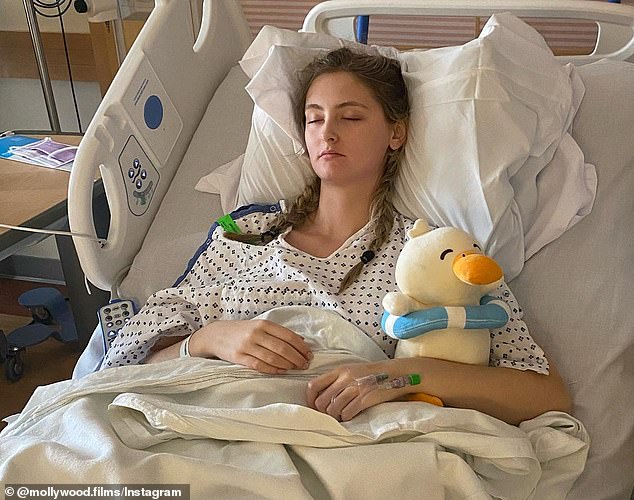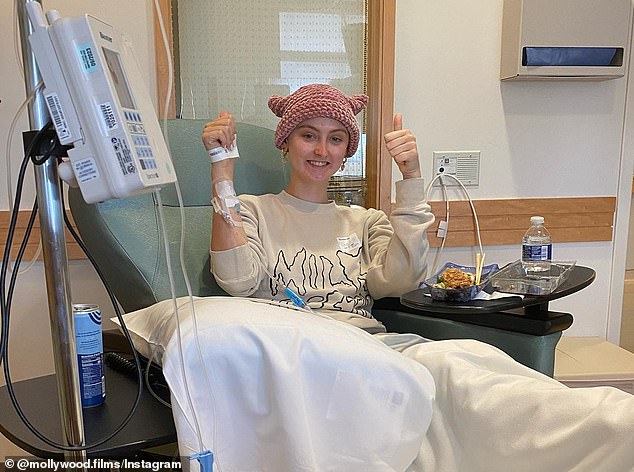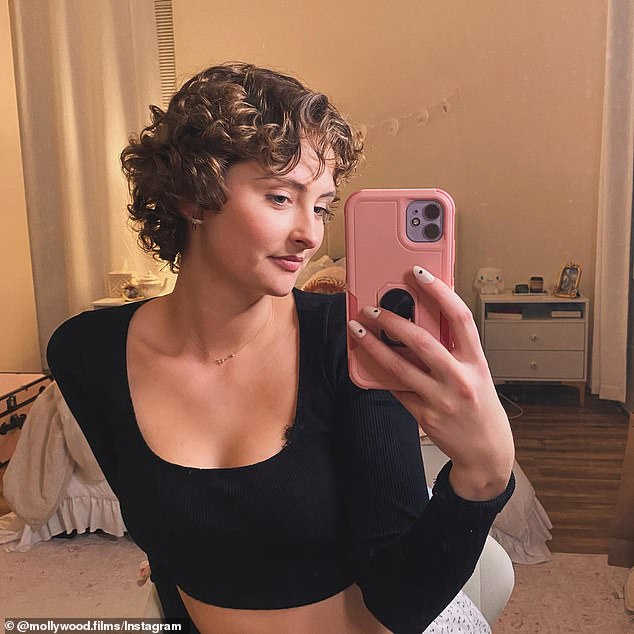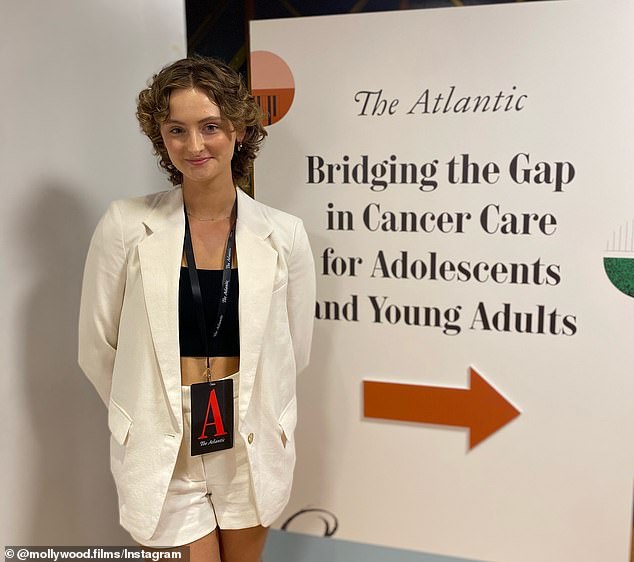Yale student, 21, is diagnosed with cancer after months of fighting with doctors to be heard when they dismissed her condition as dehydration and anxiety – as she reveals the symptoms they missed
A Yale student was diagnosed with cancer after months of pleading with her doctors to be taken seriously, claiming she was merely suffering from dehydration and anxiety.
Molly Smith was only 20 years old when she started experiencing numbness in her hands and feet.
It took her a whole month before she decided to go to a doctor, because the numbness was her only symptom and she didn’t know what could be causing it.
Still, she knew this couldn’t be normal.
“The numbness was so bad that it affected my ability to walk and dance, and I wasn’t sure if I would ever get the feeling back,” Smith told Newsweek.
But the doctor told her she was probably suffering from dehydration or anxiety.
Molly Smith was only 20 years old when she started experiencing numbness in her hands and feet
For months, she went from doctor to doctor to be heard. She described one of her first appointments in an Instagram video.
She tells the doctor in the video that her hands and feet have been numb for the past two weeks and that she brought her mother to the appointment.
But the doctor replies, ‘That’s really strange. It says here that you have no medical conditions and are therefore in fairly good health, but perhaps you are just dehydrated.’
Smith says an emergency room doctor told her to drink more fluids, but she still hasn’t seen any improvement in her symptoms.
The doctor suggests that she may have carpal tunnel syndrome, then says that the numbness may go away on its own.
Finally, Smith tells the doctor that she would like a referral to a neurologist so she can do further testing.

Smith was diagnosed with ovarian cancer at age 21
After months of back and forth, Smith underwent an ultrasound, which revealed a cyst on her ovaries.
However, Smith was told the tumor was “probably benign” and that she would have to wait three months to see if it would go away.
That didn’t happen and at age 21 she was diagnosed with ovarian cancer.
She eventually underwent surgery to remove the tumor in January 2023, followed by three rounds of chemotherapy.
Smith described the experience in detail in an op-ed for Yale News, She described getting “sympathetic looks from the patients, all much older than me, because I went to my appointments alone.”

Smith eventually underwent surgery to remove the tumor in January 2023, followed by three rounds of chemotherapy
She also said she lost the ability to dance and make films and that “cancer took away the happiness from my family.”
“The hardest part was hearing my mother’s cries on the other end of the phone, hundreds of miles away,” Smith wrote at the time.
“No patient ever wants to hear that their child has cancer, especially if he or she is in another state.”
She also said she found it difficult to realize that she might not be able to have children again, before she had even thought about starting a family.
But ‘even when it feels like I’m stuck between two worlds, floating in the purgatory of the uncanny valley, my family and friends bring me back.’

Smith has now completed her treatment and is in remission

She described her experiences with cancer treatments in an op-ed for Yale News
Smith has now completed her treatment and is in remission.
But she wished the doctors had taken her seriously from the start.
“I understand that most doctors would not make the connection between neuropathy and ovarian cancer, but ignoring my concerns is unacceptable.”
Neuropathy is not a typical symptom of ovarian cancer, but gynecologic oncologist Dr. Josh Cohen said it can occur.
According to the U.S. Centers for Disease Control and Prevention, the most common symptoms of ovarian cancer include pressure in the pelvic area, abdominal pain, bloating, feeling full quickly and changes in toilet habits.
The American Cancer Society estimates that in 2024 there will be 19,680 new cases and 12,740 women will die from the cancer.
As with all cancers, risk increases with age. But as medical director of the gynecologic cancer program at City of Hope Orange County, Cohen said that cancer is “increasingly common” at a young age and that medical professionals need to pay attention to patients’ concerns.
‘A diagnosis at any age is devastating, but younger people face additional challenges, including preserving fertility, managing work and managing a job. [and] “changes in body image,” he told Newsweek.

To help others in her situation, Smith started Mission Mariposa, a nonprofit organization that aims to support and educate young people about cancer.
To help others in her situation, Smith founded Mission Mariposa, a nonprofit organization that aims to help and educate young people about cancer.
She said she hopes to raise awareness of the symptoms and encourage people to advocate for themselves.
“I wasn’t listened to because I’m young and I don’t have any medical problems, so I had to beg three doctors to take me seriously,” she told Newsweek.
“I’m so glad I did because I was lucky enough that the cancer was discovered when it was still stage one.”
Smith now uses her platform to teach others with unexplained symptoms to take notes, have someone with them at every appointment and ask for a second opinion.
“The best person to take care of your health is yourself,” she said, adding that she has followed much of her advice.
‘I took my mother to every appointment and that helped communicate the seriousness of the situation. She took notes and I did my research for every appointment.
“I’m so glad I didn’t accept those initial explanations, because otherwise it would have taken much longer for the cancer to be found.”
Cohen also said doctors should focus on “listening,” because patients “know their bodies best and should trust their instincts.”
If a patient doesn’t feel heard enough, Cohen advises him or her to seek a second opinion and advocate for themselves.
